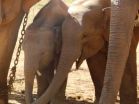(Press-News.org) Extremes of temperature and rainfall are affecting the survival of elephants working in timber camps in Myanmar and can double the risk of death in calves aged up to five, new research from the University of Sheffield has found.
With climate change models predicting higher temperatures and months without rainfall; this could decrease the populations of already endangered Asian elephants.
The researchers matched monthly climate records with data on birth and deaths, to track how climate variation affects the chances of elephant survival.
It is hoped this research – which was published in the journal Ecology – will make a difference by highlighting the importance of protecting vulnerable calves in captivity from the effects of climate change
Experts at the University of Sheffield accessed unique recordings of the life and deaths of more than 8,000 elephants from Myanmar spanning three generations throughout almost a century.
The elephants in the database are semi-captive animals working in the timber industry by pushing and dragging logs.
Lead author and PhD student Hannah Mumby, from the University of Sheffield, said: "Our results show that the optimal conditions for elephant survival correspond to high rainfall and a moderate temperature of 23ºC, but that further from those optimal conditions, elephant survival was lower.
"Overall, switching from good to bad climatic conditions within an average year significantly increases mortality rates of elephants of all ages. The most dramatic example comes from baby elephants, whose risk of death before the age of five approximately doubles in the hottest weather in comparison to the optimal moderate temperature for elephant survival."
The researchers found that increases in deaths from heat stroke and infectious diseases accounted for the larger number of deaths during the hot months. Elephants are vulnerable to heat stress because their large size and because they don't sweat like humans or pant like dogs to cool down.
"These results could have important implications for Asian elephant populations both in western zoos, where they may experience unfamiliar climate," added Hannah, "and in range countries where climate may be changing faster than elephants can adapt to it. It also highlights the importance of protecting vulnerable calves from extremes of temperature because more calves will be needed to maintain the dwindling population of endangered Asian elephants."
INFORMATION:
The project is funded by the Natural Environment Research Council (NERC) and was carried out at the University of Sheffield and Wissenschaftskolleg zu Berlin and the Leibniz Institute for Zoo and Wildlife Research in Germany.
Low rainfall and extreme temperatures double risk of baby elephant deaths
2013-02-04
ELSE PRESS RELEASES FROM THIS DATE:
Your history may define your future: Tell your doctor
2013-02-04
Boston, MA—Your family history is important, not just because it shaped you into who you are today, but it also impacts your risk for developing cancer and other chronic diseases. For example, if one of your family members had cancer, your primary care doctor needs to know. Being able to identify individuals at increased risk can help reduce mortality. In a study published this week in the online version of the Journal of General Internal Medicine, researchers at Brigham and Women's Hospital (BWH) found that patients who use a web-based risk appraisal tool are more likely ...
Tropical rainfall patterns varied through time
2013-02-04
PITTSBURGH—Historic lake sediment dug up by University of Pittsburgh researchers reveals that oceanic influences on rainfall in Central America have varied over the last 2,000 years, highlighting the fluctuating influence the Atlantic and Pacific Oceans have on precipitation.
The Pitt study, published in the February print edition of the peer-reviewed journal Geology, shows that factors currently producing drier climates in Central America actually resulted in wetter conditions a few hundred years ago, providing a deeper understanding of drought cycles in that region ...
Study finds health departments hindered in addressing health concerns from animal production sites
2013-02-04
State and local health departments face significant barriers and usually do not get involved when confronted with public health concerns resulting from food animal production sites, according to a new study led by researchers at the Johns Hopkins Center for a Livable Future at the Bloomberg School of Public Health.
The authors of the study, published in PLOS ONE, an open-access publisher of scientific research, examined the role of local and state health departments in responding to and preventing community-driven concerns associated with animal production sites. This ...
Defying the laws of Mendelian inheritance
2013-02-04
In 2005, Susan Lolle and colleagues from Purdue University published a paper in Nature, concluding that Arabidopsis thaliana plants do not obey the laws of Mendelian inheritance (the idea that all genes are inherited from their parents). Instead, Lolle found that these plants were demonstrating genetic traits from older generations, which shouldn't be possible according to our current understanding of how genes are passed on.
At the time of publishing, the paper was recommended by 20 F1000Prime Faculty Members, and it is still one of the all-time top 10 papers on the ...
Scientists notch a win in war against antibiotic-resistant bacteria
2013-02-04
Boston, MA, February 4, 2013 – A team of scientists just won a battle in the war against antibiotic-resistant "superbugs" -- and only time will tell if their feat is akin to the bacterial "Battle of Gettysburg" that turns the tide toward victory.
They won this particular battle, or at least gained some critical intelligence, not by designing a new antibiotic, but by interfering with the metabolism of the bacterial "bugs" – E. coli in this case – and rendering them weaker in the face of existing antibiotics, as reported today in Nature Biotechnology.
It's the "kick ...
Does the functionality of your small finger determine your ability to master the violin?
2013-02-04
After the recorder, the violin is the instrument most commonly offered to children by state schools in the UK. The violin is a challenging instrument. Rapid, independent motion of the digital joints in the left hand is desirable. This study was conceived after an 11-year-old patient volunteered that she had given up playing the violin because of difficulty and discomfort manoeuvring the left small and ring fingers independently. On exami¬nation, she was found to have absent FDS (flexor digitorum superficialis) function in the small finger. The research investigated whether ...
Survival of the fittest: Predator wasps breed at the expense of spider juveniles
2013-02-04
Two wasp species, Calymmochilus dispar and Gelis apterus, have been recorded as parasitoids on ant-eating spiders in a study published in the open access journal ZooKeys. The host spider, Zodarion styliferum, belongs to the largest genus of predominantly ant-eating spiders. Their distribution area includes Europe, Asia and North Africa, significantly with at least 35 species reported for the Iberian Peninsula only, marking a record in numbers in Portugal, where this study was conducted.
Available data on the biology of the host spider shows that all species of the genus ...
Taking insulin for type 2 diabetes could expose patients to greater risk of health complications
2013-02-04
Examining the UK Clinical Practice Research Datalink (CPRD) - data that characterises about 10% of the UK population - a team of researchers from Cardiff University's School of Medicine looked at the risk of death for patients taking insulin compared with other treatments designed to lower blood glucose levels in people with type 2 diabetes.
The team's epidemiological study found people have greater risk of individual complications associated with diabetes such as heart attack, stroke, eye complications and renal disease when compared with patients treated with alternative ...
Into the quantum Internet at the speed of light
2013-02-04
This press release is available in German.
Thanks to the strange laws of quantum mechanics, quantum computers would be able to carry out certain computational tasks much faster than conventional computers. Among the most promising technologies for the construction of a quantum computer are systems of single atoms, confined in so-called ion traps and manipulated with lasers. In the laboratory, these systems have already been used to test key building blocks of a future quantum computer. "Currently, we can carry out successful quantum computations with atoms," explain ...
High-dose Vorinostat effective at treating relapsed lymphomas
2013-02-04
SEATTLE – Patients whose aggressive lymphomas have relapsed or failed to respond to the current front-line chemotherapy regimen now have an effective second line of attack against their disease. Reporting the results of a first-of-its-kind phase 1 clinical trial to test the effectiveness of a new class of drugs to augment standard chemotherapy, a team led by Fred Hutchinson Cancer Research Center scientists found that giving patients high doses of Vorinostat (suberoylanilide hydroxamic acid) in combination with another round of commonly used second-line drugs resulted in ...



